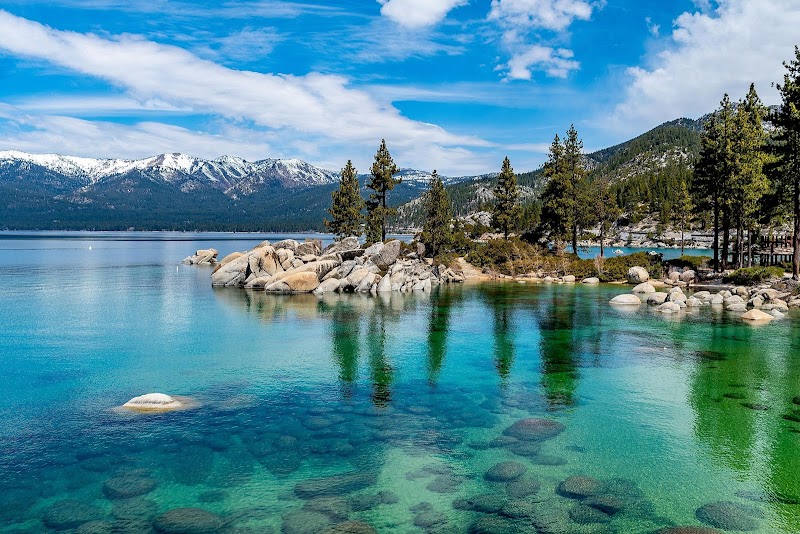
eco-tours near South Lake Tahoe, California
Eco-tours near South Lake Tahoe, California offer an immersive yet sustainable way to experience the region’s natural beauty. Discover guided adventures that combine education with minimal environmental impact, perfect for travelers seeking meaningful outdoor experiences.
Choose Appropriate Footwear
Wear sturdy, waterproof hiking shoes or boots that offer traction on mixed terrain to maintain balance and protect your feet on uneven, sometimes wet pathways.
Stay Hydrated at Altitude
South Lake Tahoe sits over 6,200 feet above sea level; carry at least 2-3 liters of water and drink frequently to offset altitude dehydration during your eco-tour.
Respect Local Wildlife
Maintain a safe distance from animals and avoid feeding them, supporting conservation efforts and reducing stress on native species.
Pack Layered Clothing
Mountain weather changes rapidly—bring layers including a windbreaker and moisture-wicking base layers to adapt to temperature swings during your tour.
eco-tours near South Lake Tahoe, California
Explore Eco-Tours Near South Lake Tahoe, California
South Lake Tahoe sits at the crossroads of wilderness and recreation, a place where the Sierra Nevada’s towering pines and clear waters demand respect and fuel adventure. For those eager to experience this landscape with minimal impact, eco-tours near South Lake Tahoe, California offer a chance not just to witness nature but to engage with it thoughtfully. These tours prioritize sustainability—guiding visitors through carefully managed paths, introducing them to native flora and fauna, and unfolding the stories of the land without leaving a footprint.
Eco-tours here balance adventure with education. Whether it’s a guided hike, a kayak trip on Lake Tahoe’s shimmering surface, or a mountain biking route that respects critical habitats, these tours invite travelers to move deliberately through an environment fiercely itself. The guides, often local naturalists, provide insights on conservation efforts and the geological forces sculpting this region’s unique character.
While South Lake Tahoe itself is renowned for its ski slopes and summer festivals, eco-tour operators focus on quieter gateways to wilderness. These ventures range from half-day excursions to immersive multi-day experiences—each constructed around principles of low-impact travel. Expect small groups, carefully timed departures to avoid crowding, and gear suited to minimizing ecological disturbance.
Weather and seasons shape the tours dramatically. Snowmelt fuels rushing streams in spring, while summer invites alpine meadows to bloom. Autumn turns the forests gold, and winter blankets the region, pivoting tours toward snowshoeing or guided interpretive walks through silent woods.
Planning your eco-tour requires preparation: sturdy footwear that can handle varied terrain, hydration specifically tailored to altitude and exertion, and layered clothing adaptable to shifting mountain conditions. The underlying thread is respect—for the environment, the local communities, and the adventure itself.
For travelers ready to embark on the best nature-based adventures, below is a gateway to the most trusted and thrilling eco-tours near South Lake Tahoe, California. From this page, you can find detailed options that highlight the intersection of outdoor adventure and environmental stewardship, providing the ultimate guide for a trip that’s as responsible as it is exhilarating.
Nearby Trips
All Adventures
Boat Charters
Water Activities
Adventures near South Lake Tahoe, California
Discover the unique and memorable adventures that make South Lake Tahoe, California special.
Frequently Asked Questions
What exactly are eco-tours near South Lake Tahoe, California?
Eco-tours are guided outdoor experiences focusing on environmental education and conservation. They allow visitors to explore the local landscape with minimal ecological impact, often involving hiking, kayaking, or biking on designated routes.
Do eco-tours require a high level of fitness?
Most eco-tours near South Lake Tahoe are moderate in difficulty. Basic fitness for hiking and light paddling is generally sufficient, but tours vary from easy walks to moderate full-day excursions.
Are eco-tour operators following sustainability guidelines?
Yes, reputable eco-tour operators adhere strictly to Leave No Trace principles, keep group sizes small, and often partner with local conservation groups to protect the environment.
What wildlife might I see on these tours?
Expect to see animals like black bears, mule deer, various bird species including osprey and bald eagles, and occasionally smaller mammals like marmots and squirrels.
Is it necessary to book eco-tours in advance?
Booking ahead is recommended, especially in peak seasons (summer and fall), to ensure availability and to allow operators to manage group sizes responsibly.
What should I bring for an eco-tour in South Lake Tahoe?
Arrive prepared with proper footwear, layered clothing, sun protection, water, snacks, and any specialized gear noted by your tour operator.
Recommended Gear
Waterproof Hiking Boots
Protect your feet and ensure good traction on wet or muddy ecological trails, especially in springtime.
Hydration Pack
Keep a steady water supply on hand to combat dehydration at altitude and during strenuous activity.
Layered Clothing
Adjust for fluctuating temperatures with moisture-wicking and insulating layers.
Binoculars
Ideal for spotting birds and distant wildlife without disturbing their natural behavior.
Local Insights
Hidden Gems
- "Cascading waterfalls just off the beaten path on the Fallen Leaf Trail"
- "Quiet paddle spots in Fannette Bay with serene views of the granite cliffs"
Wildlife
- "Look for the elusive pine marten in dense conifer stands"
- "Watch for great horned owls during dusk hikes"
History
"The Washoe people have inhabited the Lake Tahoe region for thousands of years, with eco-tours often sharing cultural stories tied to the land and its natural resources."
